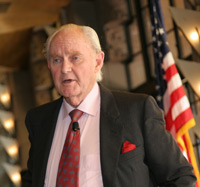
William R. Polk
William R. Polk is a veteran foreign policy consultant, author and professor who taught Middle Eastern studies at Harvard. President John F. Kennedy appointed Polk to the State Department’s Policy Planning Council where he served during the Cuban Missile Crisis. His books include: Violent Politics: Insurgency and Terrorism; Understanding Iraq; Understanding Iran; Personal History: Living in Interesting Times; Distant Thunder: Reflections on the Dangers of Our Times; and Humpty Dumpty: The Fate of Regime Change.
Exclusive: The neocon strategy of "regime change” has proved financially costly and strategically disastrous – setting almost the entire Middle East on fire – but almost no lessons have been learned, no accountability assessed, and no relevant questions asked, writes ex-U.S. diplomat William R. Polk.
Apparently, the United States, perhaps Great Britain and almost certainly Turkey, Jordan and Saudi Arabia are on the brink of a major escalation of war in what we now can call "the former Iraq and Syria.” But is this rational? Are we drawing lessons from our interventions in the past? Is there a realistic post-intervention plan? How much will intervention cost? And, finally, will it accomplish the presumed objective of making the situation better with more security for them and for us?
These are questions we should be asking now – not after the fact. Perhaps somewhere deep in government council rooms these questions are being asked. If so, those asking them are certainly not sharing their answers, if they have any, with us. And since we will be paying the bills for whatever decisions are adopted, we have what in government usage is called a "Need to Know.”
Barack Obama, then President-elect, and President George W. Bush at the White House during the 2008 transition.
I have no access to the thinking of the inner circles of any of the relevant governments, and from the sketchy and undemanding accounts in the media, it does not appear that anyone else has better access than I do. What I do have is 69 years of observation and study of the Middle East of which four were spent as the Member of the U.S. State Department’s Policy Planning Council responsible for the Middle East.
This does not give me an up-to-the-minute "take” on events – several journalists provide that much better than I could – but perhaps my years of experience give me a framework in which to place current events. So let me sketch answers to the questions citizens should ask:
First, are we thinking rationally and not emotionally? As an old policy planner, that means to me, "are we weighing all the questions before jumping?” Unfortunately, the record demonstrates that we leap before we look.
In Libya, we didn’t like Muammar Gaddafi, who was not a very likeable fellow but did raise the living standards of his people dramatically – and he mostly kept various tribes and political rivals from killing one another. After the U.S.-backed "regime change” in 2011, Gaddafi was killed but so too were the positive results of his rule. What replaced it? Chaos and more killing.
As the Prime Minister of Italy, whose government is now nearly overwhelmed by the flood of refugees, remarked, we should have thought about the consequences before we destroyed Libya’s government.
In Iraq, we didn’t like Saddam Hussein. He, too, was not a likeable fellow, but under his rule Iraq became one of the most advanced societies in Asia. Its citizens benefitted from free education, free health facilities and a high standard of living. Then, in 2003, the United States got rid of him, doing a very good job of destroying "his” Iraq but there has been nothing good to say about the leaders and institutions that took Saddam’s place.
And, in Afghanistan, President George W. Bush was angry because the Taliban refused to turn over Osama bin Laden as demanded, with no thought as to why they wouldn’t. The record shows that the Bush administration was hardly aware that Afghans had a cultural tradition with rules of their own regarding such matters.
Instead, the United States rushed in, took over Afghanistan and installed a group of people as rulers who said they were our kind of folks. We were delighted and never stopped to compare what they said with what they were doing. The policy? It was to throw money at the country, though little of it has stuck, except inside the pockets of corrupt officials.
Even the Afghan leader we installed as president, no piker himself when it came to making off with our money, complained that most of what the United States gave the country ended up in foreign bank accounts.
So, despite — or because of — whatever good the U.S. thought it was doing, Afghanistan fell apart; drug lords brutally oppressed the people in the countryside where opium cultivation and heroin production skyrocketed; even in downtown Kabul there was no law. There is not a single "secure” place in the country.
The human and financial costs of these interventions have been staggering. Hundreds of thousands dead with many more maimed; whole cities that took generations to build wrecked; perhaps $5 trillion of U.S. taxpayers’ money spent; and the whole area turned into a no man’s land. Aren’t those consequences something we should learn from?
Yet, I see no signs that any lessons have been learned. Far from the "best and the brightest” – who made their own grievous mistakes in the Vietnam War – America’s current leaders appear to be the "most determined and closed minded.” When one prescribed tactic fails, they loudly and repeatedly urge that it be implemented again in the next crisis.
In trying to find something positive to say about these adventures, all I can come up with is that there were moments of tactical success amidst the absence of strategy. We know how to destroy buildings, to find and kill insurgents, and to dole out vast sums of money. We just don’t know whether we should be doing any of these things or not.
We do them because we know how to and have the means to do so. But the outcomes are never as predicted. When the existing institutions are perverted or destroyed, insurgencies follow; all law and order breaks down; populations flee; and "collaterally” drug production and other criminal activities multiply.
U.S. taxpayers’ money is wasted on a colossal scale while those locals who are supposedly helping us either sit on their hands or make the problem worse. But Americans apparently don’t like to hear about failures and no one is held accountable for the staggering waste.
On July 1, the congressionally mandated Special Inspector General for Afghanistan Reconstruction (SIGAR) issued another one of his astonishing reports on incompetence, waste and corruption, this one dealing with the disappearance of a relatively small amount, only $210 million, spent on facilities whose locations were described by bogus coordinates.
As the reporting officer said, "to prove meaningful oversight of these facilities, [we] need to know where they are.” But "Thirteen coordinates were not located in Afghanistan, with one located in the Mediterranean Sea. Coordinates for 30 facilities were located in a province different from the one USAID reported. In 13 cases, USAID reported two different funded facilities at the same coordinates. 189 showed no physical structure within 400 feet of the reported coordinates, and a subset of 81, or just under half of these locations, showed no physical structure within a half mile of the reported coordinates. … 154 coordinates did not clearly identify a specific building.”
The U.S. military command tried to shut down SIGAR’s disclosures by classifying the findings, so Americans would be kept from knowing what every peddler in the Kabul bazaar already knows, that U.S. aid is being plundered.
The hard truth is that U.S. officials had no feasible post-intervention plan in Afghanistan, Iraq or Libya – and the costs for those interventions now include unending warfare measured in the trillions of dollars. And, rather than making the American people safer, the "collateral” damages, I predict, will include attacks on America, Europe and Western assets abroad. Derivatives of these events will include the growth of fear, the decline of trust in one another, and the eroding of our civic culture.
Who could put a cost figure on all that? Yet, when the next foreign policy crisis arises, U.S. officials do the same destructive things all over again. In short, it would have been difficult to design policies more calculated to destroy our sense of well-being. After all, Americans got together as a nation-state in the late Eighteenth Century to, among other things, "secure The Blessings of Liberty to ourselves and our Posterity.”
As the first U.S. President, George Washington, warned us, "The peace often, sometimes perhaps the Liberty, of Nations has been the victim” of imprudent action. We should put his advice into a modern context and heed it.




_jpg/250px-ElbeDay1945_(NARA_ww2-121).jpg)







